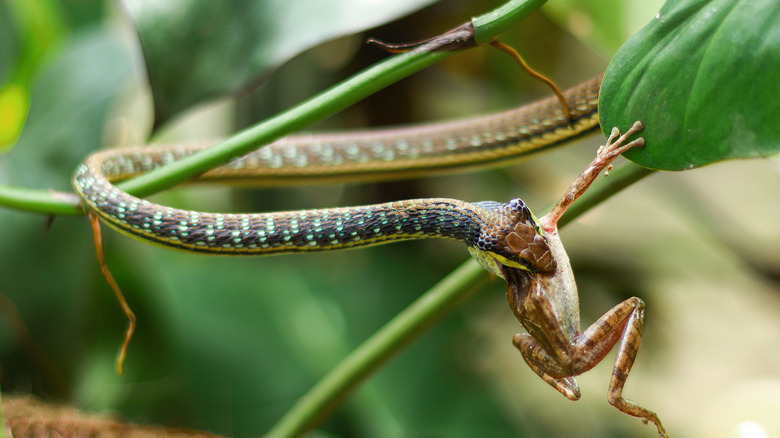Is Cayenne Pepper Really An Effective Snake-Repellent?
Cayenne pepper, commonly touted as a natural snake repellent, has been a subject of debate regarding its effectiveness. Intriguingly, a 2023 study in the journal Toxicon makes a fleeting mention of cayenne pepper as a potential method for managing snakes, yet it does not delve into detailed evidence or extensive research. This omission is significant, especially considering the reliance on cayenne pepper in various homemade repellent recipes. The central belief around cayenne pepper's efficacy hinges on the assumption that its heat might cause discomfort or harm to snakes. However, this notion fails to consider the anatomical resilience of snakes. Their scaly skin is designed to withstand various environmental challenges, making it unlikely that cayenne pepper's heat would have any substantial effect.
Furthermore, cayenne pepper's reputation as an insect deterrent may have somehow extended to snakes, despite a lack of concrete evidence supporting this claim. The popularity of this spice for repelling snakes from your garden or lawn is more rooted in myth and anecdotal reports than in scientific validation. Given the gap between popular perception and scientific evidence, it's important to approach this topic with a critical eye. The reliance on cayenne pepper as a snake repellent, despite its questionable efficacy, underscores the need for more research and education on snake management strategies. That being said, the key to an effective snake repellent lies in a deeper understanding of snake biology and habitat preferences.
Understanding snake habitat and behavior
To grasp why snakes might find their way onto your property, start by examining their natural behaviors and needs. First, consider the snake's diet, which is a primary factor in its habitat choice. Snakes predominantly feed on rodents, frogs, insects, and smaller animals. If your property or its surroundings are abundant in such prey, it inadvertently becomes an attractive spot for snakes. If the cayenne pepper, despite its pungency, does not deter these food sources, it's highly unlikely it will also deter snakes.
Next, focus on the shelter aspect. Snakes instinctively search for hiding spots where they feel secure. In the wild, this means under rocks, amidst dense foliage, or within fallen logs. However, in urban or suburban settings, gardens, overgrown lawns, woodpiles, and cluttered areas can mimic these natural habitats. If your lawn has such an abundance of vegetation, you'll have to sprinkle cayenne pepper on all areas, which seems like an arduous task considering there's little evidence it works.
By addressing these main aspects — food and shelter — you're actively engaging with the reasons snakes may be drawn to your property. It also helps to consider the reproductive habits of snakes. When it's time to lay eggs, snakes seek environments that ensure the safety and viability of their offspring. This reproductive drive can sometimes lead them to venture into human-inhabited areas, especially if they offer food, shelter, and warmth. To effectively deter them, you need to create an environment that doesn't cater to their basic survival needs.
Effective ways to repel snakes
When repelling snakes, an integrated approach, targeting their habitat and food sources, proves more effective than simple solutions like cayenne pepper. A comprehensive strategy should include environmental modifications and the use of science-backed, naturally repelling plants. Firstly, addressing the food sources that attract snakes reduces the primary incentive for snakes to visit. This can be achieved through proper waste management, ensuring that food scraps and garbage are securely stored, and employing natural pest control methods to keep rodent and insect populations in check.
Yard maintenance also plays a crucial role in deterring snakes. A well-kept garden with short grass and minimal debris is less inviting to snakes, as it offers fewer hiding spots and breeding grounds. Regularly clear away leaf litter, woodpiles, and other clutter. Seal entry points into buildings and fill in gaps in foundations, walls, and around pipes.
You can also incorporate science-backed plants into your landscaping. The herb Anamu, highlighted in a 2022 study in the Brazilian Journal of Biology, has been noted for its potential as a snake repellent. Applying the herb in various areas with snake activity might help. You can also consider growing marigolds, another plant believed to deter snakes, possibly due to their strong scent and deep roots which might disturb snakes' underground habitats. While commercial snake repellents are an option, their effectiveness can vary. These products often rely on chemicals, so their use should be balanced with environmental and safety considerations.


